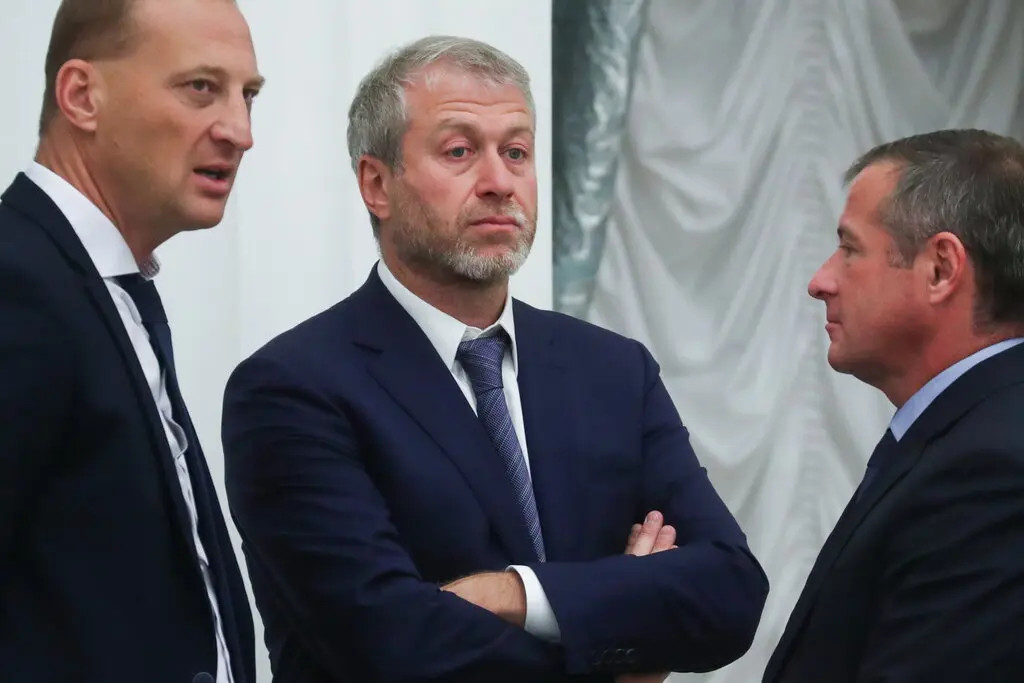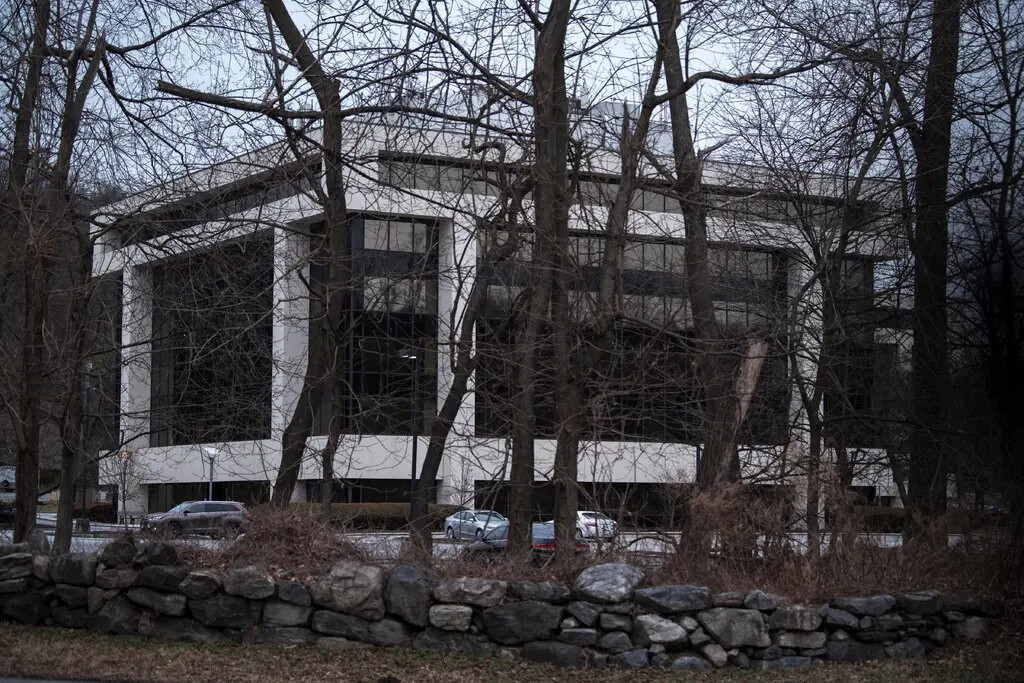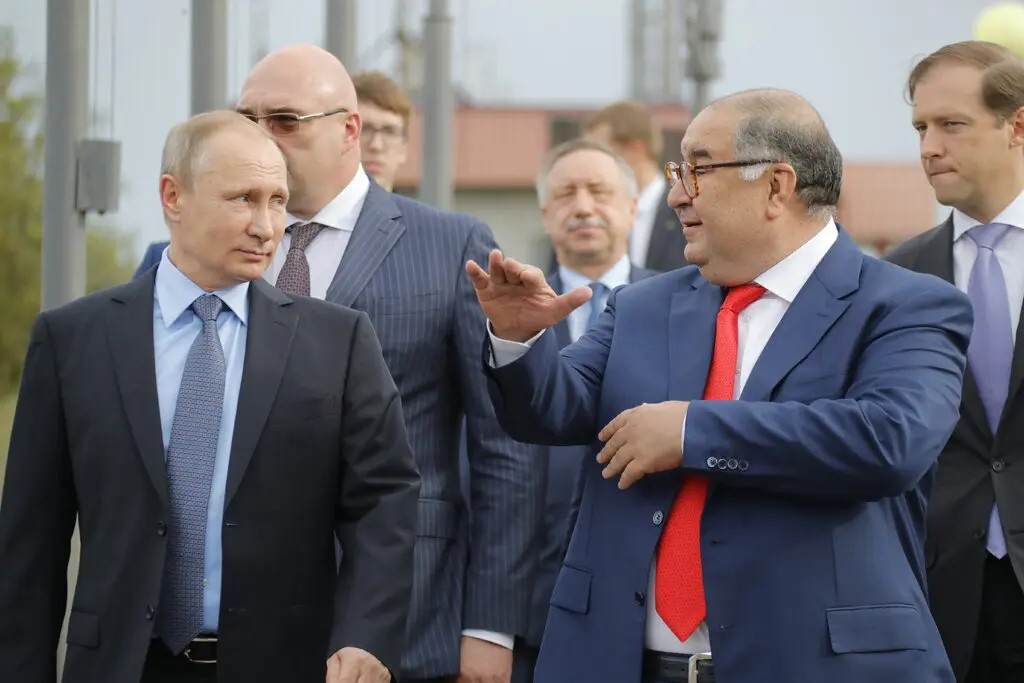
Date: 2024-07-17 Page is: DBtxt003.php txt00021842
RUSSIA
PROFESSIONAL ENABLERS IN THE WEST
How Western Firms Quietly Enabled Russian Oligarchs
PROFESSIONAL ENABLERS IN THE WEST
How Western Firms Quietly Enabled Russian Oligarchs

Roman Abramovich, center, before a meeting with the Russian president Vladimir V. Putin in 2017.Credit...Sergei Savostyanov/TASS via Getty Images
Original article: https://www.nytimes.com/2022/03/09/business/russian-oligarchs-money-concord.html
Burgess COMMENTARY
I have argued for years that much ... actually most ... of the academic analysis of economic performance is woefully inadequate.
Since the Russian invasion of Ukraine and the imposition of sanctions by the West, I have learned something of the world of superyachts. While many of these are owned by Russian oligarchs, not to mention by Vladimir Putin himself, what is interesting is to think about how the existence and ownership of these vessels has benefitted all sorts of actors in the West.
Though the owners of many of these mega superyachts are owned by Russians, most of them have been built in the recent past by shipyards in Europe. This has been extremely valuable business for these shipyards. Enough said.
The running of these mega superyachts is also a costly matter, and what is cost for the owner becomes revenue for the supplier of all the essential goods and services. Doing business with the wealthy can be very profitable if one knows how to do it ... and there are many who do.
Now that there are fairly draconian sanctions in place, there are some professional (ouch) firms who will make out like bandits to help the superwealthy avoid the sanctions !!!!!!!
It has been common knowledge for years that real estate is one of the enablers of money laundering at scale ... but very little has been done about it even though it is an obnoxious part of the modern socio-enviro-economic system. Many fashionable parts of the world are deeply implicated in this, not least of which are New York City, London, parts of Florida, the South of France and countless other locations. Oligarchs and drug cartels may own multiple zillion dollar residences, while much of the world's ordinary folk are homeless. The system has become dysfunctional.
And while hiding wealth helps to keep hold of the wealth, it is also helpful when reporting for tax purposes. The amount of tax not paid by the rich and powerful is ataggering, and for some reason the political elites do nothing to fix the problem. Why is anyone not surprised!!!!!!!!!
Peter Burgess
Investment, law and lobbying firms have helped enmesh Kremlin-linked oligarchs into the Western financial and legal systems.
Written by Matthew Goldstein, Kenneth P. Vogel, Jesse Drucker, Maureen Farrell and Mike McIntire
March 9, 2022
Behind a set of imposing metal doors in an easy-to-miss office building in a New York City suburb, a small team manages billions of dollars for a Russian oligarch.
For years, a group of wealthy Russians have used Concord Management, a financial-advisory company in Tarrytown, N.Y., to secretly invest money in large U.S. hedge funds and private equity firms, according to people familiar with the matter.
A web of offshore shell companies makes it hard to know for sure whose money Concord manages. But several of the people said the bulk of the funds belonged to Roman Abramovich, a close ally of President Vladimir V. Putin of Russia.
Concord is part of a constellation of American and European advisers — including some of the world’s largest law firms — that have long helped Russian oligarchs navigate the Western financial, legal, political and media landscapes.
Now, with U.S. and European sanctions targeting those close to Mr. Putin, firms are wrestling with what to do with these lucrative but controversial clients.
Many are ditching them. Some appear to be sticking with them. Others won’t say what they are doing.
In the meantime, lawyers and investment advisers are coming under intense scrutiny for work that weeks earlier was occurring almost entirely below the public radar.
Concord, whose representatives declined to comment, has attracted the attention of congressional investigators. On Wednesday, a lawmaker wrote to the Biden administration requesting a freeze on Mr. Abramovich’s funds at Concord.

Wealthy Russians have used Concord Management, an advisory firm in Tarrytown, N.Y., to invest their money.Credit...Karsten Moran for The New York Times
In Britain, which has a thriving industry of attorneys who specialize in hiding assets, lawmakers have taken to the floor of Parliament to denounce lawyers and law firms that are continuing to work with oligarchs.
Legally speaking, at least, there is nothing wrong with working for companies, individuals or governments that are under sanctions so long as certain rules are followed.
In the United States, lawyers are allowed to represent such clients in court or before government agencies, and they can advise them on complying with sanctions. Lobbyists and public relations firms must obtain licenses from the Treasury Department to represent these entities.
As a result of the bureaucratic hurdles and reputational risks, the going rate for law and lobbying firms representing oligarchs who are under sanctions has soared into the millions of dollars, according to people familiar with the industry.
For many firms, the paydays are not enough to make up for the potential reputational damage of working for Kremlin-linked oligarchs. A flurry of Western lobbying, law and public relations firms have recently dropped their Russian clients or operations.
A spokeswoman for the law firm Skadden Arps said it was “in the process of ending our representations of Alfa Bank,” an oligarch-controlled company that has been placed under sanctions. (Skadden has also represented Mr. Abramovich, the billionaire owner of England’s Chelsea Football Club, but she wouldn’t say whether that work continues.)
The international law firms Linklaters and Norton Rose Fulbright both said they were leaving Russia. A spokeswoman for another large firm, Debevoise & Plimpton, said it was terminating several client relationships and would not take any new clients in Moscow. Ashurst, a large London-based law firm, said it would not “act for any new or existing Russian clients, whether or not they are subject to sanctions.”
The accounting giants PwC, KPMG, Deloitte and EY — which have provided extensive services to oligarchs and their networks of offshore shell companies — also said they were leaving Russia or severing ties with their local affiliates.
Some firms parted ways with Russian clients whose praises they had been singing in the days leading up to the invasion.
Last month, a Treasury official turned lobbyist wrote a letter to the White House arguing that Russia’s Sovcombank shouldn’t face sanctions, citing the bank’s commitment to gender equity, environmental and social responsibility.
Sovcombank had agreed to pay the lobbyist’s firm, Mercury Public Affairs, $90,000 a month for its work.
The Biden administration recently imposed sanctions on Sovcombank. Within hours of the announcement, Mercury filed paperwork with the Justice Department indicating that it was terminating its contract with Sovcombank.
As recently as mid-February, the British law firm Schillings represented the Russian oligarch Alisher Usmanov, a longtime ally of Mr. Putin.
Two weeks later, the European Union and the U.S. Treasury placed sanctions on Mr. Usmanov. Nigel Higgins, a spokesman for Schillings, said the firm is “not acting for any sanctioned individuals or entities.”

Mr. Putin and his longtime ally Alisher Usmanov, right, in 2017.Credit...Getty Images
Another lawyer, Thomas A. Clare, has written threatening letters to news organizations on behalf of clients, including the Russian oligarch Oleg V. Deripaska. In 2019, for example, he warned that he might try to hold The New York Times “liable for the catastrophic economic damages” facing Mr. Deripaska, who at the time was under sanctions.
Mr. Clare said this week that his firm, Clare Locke, hadn’t worked for Mr. Deripaska since September, “and we do not foresee doing so again in the future.”
Russian companies like Rosneft, VTB, Alfa Bank, Gazprom and Sberbank, which are now under sanctions, have been represented by leading U.S. law firms including White & Case, DLA Piper, Dechert, Latham & Watkins and Baker Botts.
None of those firms would say whether they were still working with the Russian companies.
Baker McKenzie, one of the world’s largest law firms, continues to say on its website that it represents “some of Russia’s largest companies,” including Gazprom and VTB. The firm said it was “reviewing and adjusting our Russia-related operations and client work” to comply with sanctions.
In Washington, Erich Ferrari, a leading sanctions lawyer, is suing the Treasury on behalf of Mr. Deripaska, who is seeking to overturn sanctions imposed on him in 2018 that he claims have cost him billions of dollars and made him “radioactive” in international business circles.
And the lobbyist Robert Stryk said he had recently had conversations about representing several Russian oligarchs and companies currently under sanctions. He previously represented clients targeted by sanctions, including the administrations of President Nicolás Maduro of Venezuela and former President Joseph Kabila of the Democratic Republic of Congo.
Mr. Stryk said he would consider taking the work if the Treasury Department provided him with the necessary licenses, and if the prospective clients opposed Russia’s aggression in Ukraine.

The entrance to Concord Management.Credit...David Enrich/The New York Times
Concord Management appears to be devoted almost entirely to managing the money of a small handful of ultrawealthy Russians.
The unregistered investment firm has been operating since 1999 with a staff of about two dozen. It specializes in investing in hedge funds and real estate funds run by private equity firms, according to online profiles of current and former Concord employees.
The Russia-Ukraine War and the Global Economy Card 1 of 6
Rising concerns. Russia’s attack on Ukraine has started reverberating across the globe, adding to the stock market’s woes and spooking investors. The conflict could cause dizzying spikes in prices for energy and food, and severely affect various countries and industries.
The cost of energy. Oil prices already are the highest since 2014, and they have jumped as the conflict has escalated. Russia is the third-largest producer of oil, providing roughly one of every 10 barrels the global economy consumes.
Gas supplies. Europe gets nearly 40 percent of its natural gas from Russia, and it is likely to be walloped with higher heating bills. Natural gas reserves are running low, and European leaders have accused Russia’s president, Vladimir V. Putin, of reducing supplies to gain a political edge.
Food prices. Russia is the world’s largest supplier of wheat and, together with Ukraine, accounts for nearly a quarter of total global exports. In countries like Egypt and Turkey, that flow of grain makes up more than 70 percent of wheat imports.
Shortages of essential metals. The price of palladium, used in automotive exhaust systems and mobile phones, has been soaring amid fears that Russia, the world’s largest exporter of the metal, could be cut off from global markets. The price of nickel, another key Russian export, has also been rising.
Financial turmoil. Global banks are bracing for the effects of sanctions intended to restrict Russia’s access to foreign capital and limit its ability to process payments in dollars, euros and other currencies crucial for trade. Banks are also on alert for retaliatory cyberattacks by Russia.
Wall Street bankers and hedge fund managers who have interacted with Concord and its founder, Michael Matlin, said it oversaw between $4 billion and $8 billion.
It isn’t clear how much of that belongs to Mr. Abramovich, whose fortune is estimated at $13 billion.
Mr. Abramovich has not been placed under sanctions. His spokeswoman, Rola Brentlin, declined to comment on Concord.
Over the years, Concord has steered its clients’ money into marquee financial institutions: the global money manager BlackRock, the private equity firm Carlyle Group and a fund run by John Paulson, who famously anticipated the collapse of the U.S. housing market. Concord also invested with Bernard Madoff, who died in prison after being convicted of a vast Ponzi scheme.
Another recipient of Concord money was Brevan Howard, a multibillion-dollar European hedge fund company. A person familiar with the matter said Brevan Howard was preparing to return the funds to Concord, which will no longer be a client.
In a letter sent Wednesday to Attorney General Merrick B. Garland, Representative Steve Cohen, Democrat of Tennessee, wrote that he had “recently received information from credible sources in the financial industry” that Concord oversaw billions of dollars for Mr. Abramovich.
Mr. Cohen, a co-chairman of a panel focused on European security, requested that the U.S. government impose sanctions on Mr. Abramovich and seize the assets at Concord, “as this blood money presents a flight risk.”
The work performed by law, lobbying and public relations firms often plays out in public or is disclosed in legal or foreign agent filings, but that is rarely the case in the financial arena.
While Russian oligarchs make tabloid headlines for shelling out for extravagant superyachts and palatial homes, their bigger investments often occur out of public view, thanks to a largely invisible network of financial advisory firms like Concord.
Hedge fund managers and their advisers said they were starting to examine their investor lists to see if any clients were under sanctions. If so, their money needs to be segregated and disclosed to the Treasury Department.
Some hedge funds are also considering returning money to oligarchs who aren’t under sanctions, fearful that Russians might soon be targeted by U.S. and European authorities.
“The implication of sanctions being imposed on Russia and its oligarchs is just rippling through the private fund community,” said Ron Geffner, a lawyer who advises hedge funds.
While firms prefer to keep their work for unsavory clients under wraps, a leak in 2017 provided a glimpse into how Western firms helped Russian oligarchs hide assets — and what happened when those clients were targeted by sanctions.
The leak, part of the Paradise Papers project, involved the files of the Appleby law firm in Bermuda. At least four clients owned private jets through shell companies managed by Appleby.
When sanctions were imposed on companies and individuals linked to Mr. Putin in 2014, Appleby jettisoned clients it believed were affected.
The Russians found other Western firms, including Credit Suisse, to help fill the void.
Ben Freeman, who tracks foreign influence for the Quincy Institute for Responsible Statecraft, said Russians were likely to find new firms this time, too.
“There is that initial backlash, where these clients are too toxic,” Mr. Freeman said. “But when these lucrative contracts are out there, it gets to be too much for some people, and they can turn a blind eye to any atrocity.”
David Segal contributed reporting. Susan Beachy contributed research.
Matthew Goldstein covers Wall Street and white collar crime and housing issues. @mattgoldstein26
Ken Vogel covers the confluence of money, politics and influence from Washington. He is also the author of “Big Money: 2.5 Billion Dollars, One Suspicious Vehicle, and a Pimp — on the Trail of the Ultra-Rich Hijacking American Politics.” @kenvogel • Facebook
Jesse Drucker is an investigative reporter for the Business desk. He previously worked for The Wall Street Journal and Bloomberg News where he won a pair of awards in 2011 for investigative and explanatory reporting from the Society of American Business Editors and Writers for a series on how U.S. multinationals shift profits into tax havens. @JesseDrucker
Mike McIntire is a reporter with the investigations unit. He won a Pulitzer Prize for his reporting on Russian interference in the 2016 presidential election, and has written in depth on campaign finance, gun violence and corruption in college sports. @mmcintire
A version of this article appears in print on March 10, 2022, Section B, Page 1 of the New York edition with the headline: Companies In the West Quietly Aid Oligarchs. Order Reprints | Today’s Paper | Subscribe
Editors’ Picks
- Alex Ovechkin Skates Into Canada’s Ukrainian Enclave as a Scorned Star
The Russia-Ukraine War and the Global Economy
Card 1 of 6 Rising concerns. Russia’s attack on Ukraine has started reverberating across the globe, adding to the stock market’s woes and spooking investors. The conflict could cause dizzying spikes in prices for energy and food, and severely affect various countries and industries.
Card 2 of 6 The cost of energy. Oil prices already are the highest since 2014, and they have jumped as the conflict has escalated. Russia is the third-largest producer of oil, providing roughly one of every 10 barrels the global economy consumes.
Card 3 of 6 Gas supplies. Europe gets nearly 40 percent of its natural gas from Russia, and it is likely to be walloped with higher heating bills. Natural gas reserves are running low, and European leaders have accused Russia’s president, Vladimir V. Putin, of reducing supplies to gain a political edge.
Card 4 of 6 Food prices. Russia is the world’s largest supplier of wheat and, together with Ukraine, accounts for nearly a quarter of total global exports. In countries like Egypt and Turkey, that flow of grain makes up more than 70 percent of wheat imports.
Card 5 of 6 Shortages of essential metals. The price of palladium, used in automotive exhaust systems and mobile phones, has been soaring amid fears that Russia, the world’s largest exporter of the metal, could be cut off from global markets. The price of nickel, another key Russian export, has also been rising.
Card 6 of 6 Financial Turmoil. Global banks are bracing for the effects of sanctions intended to restrict Russia’s access to foreign capital and limit its ability to process payments in dollars, euros and other currencies crucial for trade. Banks are also on alert for retaliatory cyberattacks by Russia.